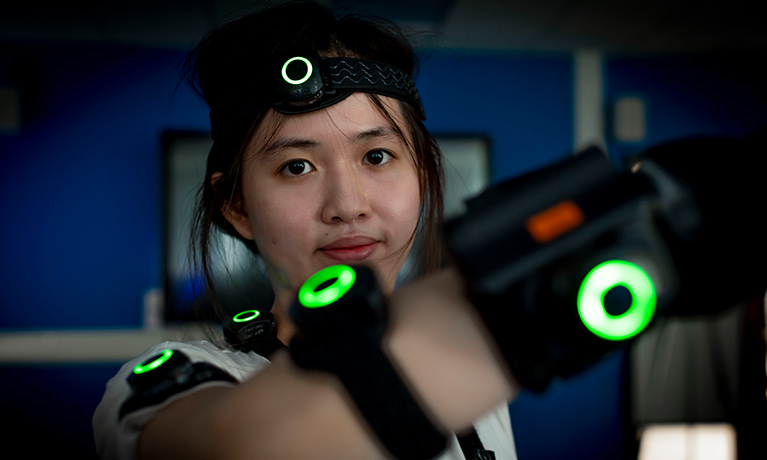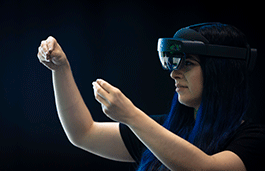Search
Games Studio Development MA
Study level: Postgraduate
Explore the exciting world of digital games development in a studio learning model that prepares you for the workforce.
Course features
Year of entry
2026-27
Location
Coventry University (Coventry)
Study mode
Full-time
Duration
1 year full-time
Course code
AHT090
Start date
September 2026
The information on this page is for 2025-26 entry and should be used as guidance for 2026-27 entry. Please keep checking back on this course page to see our latest updates.
Course overview
Launch your games industry career with this master’s course, designed for creatives from all backgrounds. Gain hands-on experience in the full game development process, collaborating with teams to design, build, and market innovative, playable games.
Key course content includes:
- Studio-based learning and mentoring: collaborate in a studio model with guidance from industry and academic mentors to build professional skills and networks.
- Industry engagement: gain insights through mandatory field trips to Royal Leamington Spa game studios, and optional field trips and masterclasses at game studios further afield.2
- Comprehensive games production: experience the full development pipeline while honing specialist skills in your chosen area.
5 QS Stars for Teaching and Facilities
QS Stars University RatingsRanked 9th Modern University in UK by the Times
The Times and Sunday Times Good University Guide 2025Ranked 4th for Overall Satisfaction in PTES
Postgraduate Taught Experience Survey (PTES) 2025Why you should study this course
- Our holistic approach to real-world learning is designed to develop your agility as a practitioner. We’ll teach you how to flex across a range of roles in small, independent game studios and become a skillset-specific practitioner with an understanding of the wider workflow in large game studios.
- You will have access to state-of-the-art facilities, including experimental immersive studios and digital and electronic hacklabs.4
- You will benefit from a strong academic base with links to gaming companies in ‘Silicon Spa’ - the nearby hub of game developers in Royal Leamington Spa.
Collaborations
We work in collaboration with The RSA (Royal Society of Arts, Manufactures and Commerce), and upon successful completion of the 'Creative Futures and Social Change' module, you will receive RSA digital badging.
At UGLA our mission is to ready the next generation of talent for the video games sector. We’re very excited by this collaboration with Coventry University. We’re proud to forge a bond between industry and education, with an MA that will be as good for the industry itself as it will be for those wanting to break in.
Luke Richards, Course Director of UGLA, 2024.

What you'll study
Underpinned by studio-based learning, this course provides a comprehensive exploration of the game development process from concept to completion. You will collaborate in interdisciplinary teams to design, prototype, and refine games, while developing industry-relevant skills in project management, pitching and quality assurance.
We regularly review our course content, to make it relevant and current for the benefit of our students. For these reasons, course modules may be updated.
How you'll learn
Teaching and learning methods may include:
- lectures
- seminars
- tutorials
- presentations
- group projects
- workshops
- practical laboratory sessions.
Teaching contact hours
As a full-time postgraduate student, you will study modules totalling 180 credits each academic year. A typical 30-credit module requires a total of 300 hours of study. Study hours are made up of teaching contact hours, and guided and independent study.
Teaching hours
Teaching hours may vary, depending on where you are in your studies, but on average you will have between 8 and 12 teaching and learning hours each week. You will also have the opportunity to attend optional sessions including time with a Success Coach or to meet with staff for advice and feedback.
Guided and independent study.
Throughout your studies, you will be expected to spend time in guided and independent learning which will make up the required study hours per module. You will be undertaking a variety of activities, learning through guided background research, planning and preparation, studio activity, creative practice and making, reviewing what you have learned and completing assignments. This can be completed around your personal commitments. As you progress towards the end of your studies, you will spend more time on independent learning.
Online learning
As an innovative university, we use different teaching methods, including online tools and emerging technologies. So, some of your teaching hours and assessments may be delivered online.
Assessment
Assessment methods may include:
- presentations
- group projects
- live simulations
- individual application development work
- portfolios
- written documentation.
The Coventry University Group assessment strategy ensures that our courses are fairly assessed and allows us to monitor student progression towards achieving the intended learning outcomes.
Co-developed with industry, this course reflects the experience of a working games studio, drawing on expertise from industry and academia to develop graduates ready to explore the many opportunities of the growing and vibrant games sector. It provides students with the opportunity to explore new and emerging technologies relevant to games development in state-of-the-art facilities.
Dr Bianca Wright, Curriculum Lead: Immersive, 2023

Entry requirements
Typical entry requirements:
Fees and funding
| Student | Full-time | Part-time |
|---|---|---|
| UK, Ireland*, Channel Islands or Isle of Man | 2026/27 fees TBC 2025/26 fees: £11,200 |
Not available |
| EU | 2026/27 fees TBC 2025/26 fees: £11,200 per year with EU Support Bursary** 2026/27 fees TBC 2025/26 fees: £18,600 per year without EU Support Bursary** |
Not available |
| International | 2026/27 fees TBC 2025/26 fees: £18,600 |
Not available |
For advice and guidance on tuition fees3 and student loans visit our Postgraduate Finance page and see the University's Tuition Fee and Refund Terms and Conditions.
We offer a range of International scholarships to students all over the world. For more information, visit our international scholarships page.
Tuition fees cover the cost of your teaching, assessments, facilities and support services. There may be additional costs not covered by this fee, such as accommodation and living costs, recommended reading books, stationery, printing and re-assessments should you need them.
The following are additional costs not included in the tuition fees:
- Any optional overseas field trips or visits: £400+ per trip.
- Any costs associated with securing, attending or completing a placement (whether in the UK or abroad).
*Irish student fees
The rights of Irish residents to study in the UK are preserved under the Common Travel Area arrangement. If you are an Irish student and meet the residency criteria, you can study in England, pay the same level of tuition fees as English students and utilise the Postgraduate Master's Loan.
**EU Support Bursary
Following the UK's exit from the European Union, we are offering financial support to all eligible EU students who wish to study an undergraduate or a postgraduate degree with us full-time. This bursary will be used to offset the cost of your tuition fees to bring them in line with that of UK students. Students studying a degree with a foundation year with us are not eligible for the bursary.
Facilities
You will have access to cutting-edge new facilities4 in the Delia Derbyshire building, which features post-production studios, games and animation studios, immersive studios and hack labs.
- The high-end studios allow you to develop working playable versions of your games using state-of-the-art hardware and software used in the industry.
- The immersive studios include performance capture, object tracking and audio capabilities allowing you to engage with development methods across the games design and development pipeline.
- The electronic and digital hack labs allow you to experiment with new and emerging technologies and electronics in the context of games development.
Facilities are subject to availability. Access to some facilities (including some teaching and learning spaces) may vary from those advertised and/or may have reduced availability or restrictions where the university is following public authority guidance, decisions or orders.
Careers and opportunities
Successful graduates may seek positions in the following job roles: games designer, games developer, level designer, narrative designer, games artist, character designer, QA tester in games, animator, game director, UI/UX designer, games producer, 3D artist, concept artist and marketing executive.
Upon successful completion, you will be able to:
- advance and refine creative, practical, and studio skills, demonstrating flexibility, initiative, and currency of knowledge in the development of games
- demonstrate a sound and sophisticated knowledge of the variety of roles within the games industry, operational studio environments, agile development, and innovation processes at the forefront of the industry
- critically understand and apply the video game development process and all its constituent components including the development lifecycle from concept to release through experiential processes
- exercise high-level collaborative skills and complex decision-making in the context of creative and multi-disciplinary teams to maximise opportunity across sectors, locally, nationally, and internationally
- practice inclusive leadership and entrepreneurship within and across the range of roles within the games industry through the articulation, application and evaluation of complex ideas, processes, and practices in a live industry context
- demonstrate a systematic and critical awareness of the evolving business and technological landscape to make ethically, legally, and economically valid decisions when producing a commercially viable product.
Where our graduates work
Successful graduates of this course have gone on to work for companies such as Leisure concepts, BYG Systems Limited, Opus books and Country Wide groups.
How to apply
You may also like






